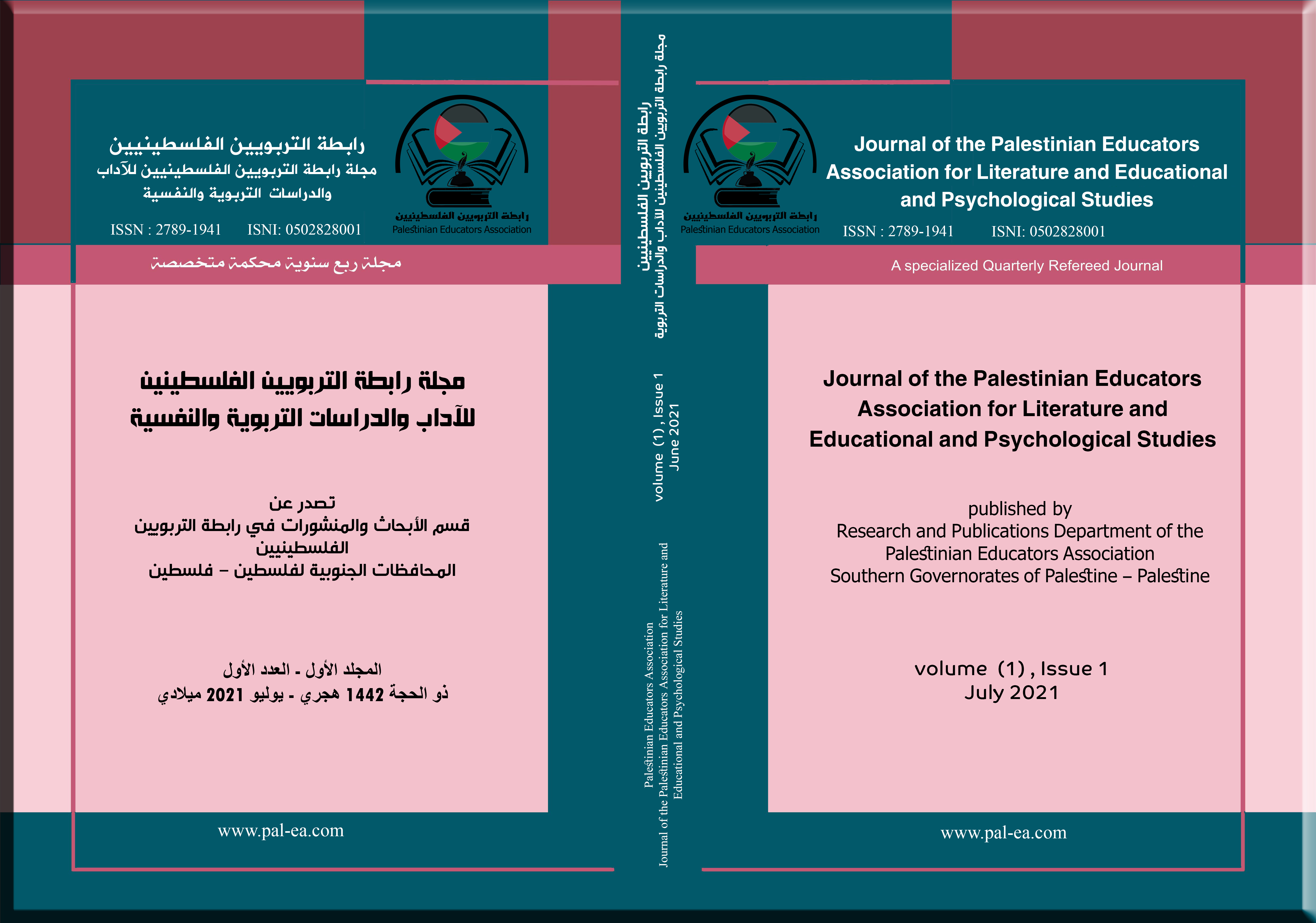The level of educational supervisors 'use of the supervisory method based on critical friendship from the teachers' point of view - Field study in UNRWA schools -
DOI:
https://doi.org/10.69867/PEAJ013Keywords:
educational supervisors, supervisory style, critical friendshipAbstract
The aim was to identify the level of educational supervisors' use in UNRWA schools of the supervisory method based on critical friendship, as well as to reveal the direction of the differences according to the variable (gender, academic qualification, and years of service). The researcher applied the descriptive method in his analytical method, and used the questionnaire on a sample of (368) a teacher was chosen by the stratified randomized method, and the most important results were: The degree of teachers ’appreciation of the educational supervisors’ use of the supervisory method based on critical friendship is large with a relative weight (71.1%). There are also statistically significant differences due to the gender variable in favor of females, and there are no differences attributable to the rest Study variables.
Downloads
References
المصادر والمراجع
المراجع العربية:
أبو شرار، عدنان (2009) درجة التزام المشرفيين التربويين بتوظيفي خصائص الإشراف التربوي الحديث في مدارس وكالة الغوث الدولية في الأردن من وجهة نظر المعلمين، رسالة ماجستير غير منشورة، جامعة الشرق الأوسط للدراسات العليا، الأردن.
أبو شملة، كامل (2009) فاعلية الأساليب الإشرافية في تحسين أداء معلمي مدارس وكالة الغوث بغزة من وجهة نظرهم وسبل تطويرها، رسالة ماجستير غير منشورة، الجامعة الإسلامية، فلسطين.
حلس، ماجد (2010) الممارسات الإشرافية وعلاقتها بالنمو المهني لمعلمي المرحلة الأساسية الدنيا في محافظة غزة في ضوء معايير الجودة، رسالة ماجستير غير منشورة، جامعة الأزهر، فلسطين.
الغتم، نورة (2007) رؤية جديدة للإشراف التربوي في ضوء متطلبات تطوير المرحلة الإعدادية، ورقة علمية مقدمة للمؤتمر "التربوي السنوي الحادي والعشرون"، المنعقد في وزارة التربية والتعليم قسم الإشراف التربوي، يناير 2007، البحرين.
مليباري، نجلاء (2013) تطوير الممارسات الإشرافية في ظل اقتصاد المعرفة لدى مشرفات اللغة العربية"، رسالة ماجستير غير منشورة، جامعة أم القرى، السعودية.
المراجع العربية الانجليزية
Abu Sharar, A. (2009) The degree of commitment of educational supervisors to employ the characteristics of modern educational supervision in UNRWA schools in Jordan from the point of view of teachers (in Arabic), unpublished master's thesis, Middle East University for Postgraduate Studies, Jordan.
Abu Shamla, K. (2009) The effectiveness of supervisory methods in improving the performance of teachers of UNRWA schools in Gaza from their point of view and ways to develop them (in Arabic), an unpublished master's thesis, the Islamic University, Palestine.
Helles, M. (2010) Supervisory practices and their relationship to the professional growth of teachers of the lower basic stage in Gaza governorate in light of quality standards (in Arabic), unpublished master's thesis, Al-Azhar University, Palestine.
Al-Ghatam, N. (2007) A New Vision for Educational Supervision in Light of the Requirements for the Development of the Preparatory Stage, a scientific paper presented to the "Twenty-first Annual Educational Conference" (in Arabic), held at the Ministry of Education, Department of Educational Supervision, January 2007, Bahrain.
Malibari, N. (2013) Developing Supervisory Practices in Light of the Knowledge Economy of Female Arabic Language Supervisors" (in Arabic), unpublished master's thesis, Umm Al-Qura University, Saudi Arabia.
ثانياً: المراجع الأجنبية:
Gardner, M. (2008): Building the SCDN learning Community: Using the Critical Friend’s Model to Explore RTI "An approach meet the needs of all student, USA.
Kiewkor, S. Wongonich, S and Piromsombat, C. (2013): "Empowerment of Teachers through Critical Friend Learning to Encourage Teaching Concepts" Paper Presented at World Conference on Educational Sciences, Bangkok-Thailand.
Downloads
Published
Issue
Section
License
Copyright (c) 2024 د.محمد عبد الكريم القططي (مؤلف)

This work is licensed under a Creative Commons Attribution-NonCommercial-ShareAlike 4.0 International License.
The Journal of the Palestinian Educators Association for Literature, Educational and Psychological Studies
E-issn: 2789-1941
Authors retain Copyright
The Journal of the Palestinian Educators Association for Literature, Educational and Psychological Studies allows Authors retain Copyright and grant the journal right of first publication with the work simultaneously licensed under a Creative Commons Attribution (CC-BY) 4.0 License that allows others to share the work with an acknowledgment of the work’s authorship and initial publication in this journal.
Provided they are the owners of the Copyright to their work, authors are able to enter into separate, additional contractual arrangements for the non-exclusive distribution of the journal’s published version of the work (e.g., post it to an institutional repository, in a journal or publish it in a book), with an acknowledgment of its initial publication in this journal.
Authors are permitted and encouraged to post their work online (e.g., in institutional repositories, disciplinary repositories, or on their website) prior to
and during the submission process.










